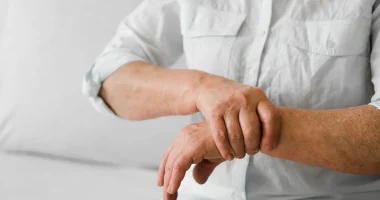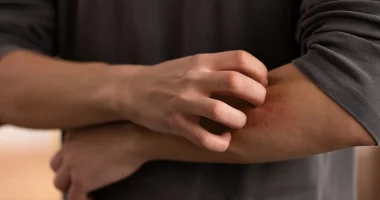Alkaptonuria is a Chronic illness, but there are number of ways to handle the signs of this condition.
Alkaptonuria is an infrequent disorder passed down by their families. It happens when your body can’t make sufficient of an enzyme known as homogentisic dioxygenase (HGD). It helps break down a harmful substance known as homogentisic acid.
Without sufficient HGD, homogentisic acid is produced in your body. This produced acid leads to discolored and brittle of your cartilage and bones.
As a result, people with alkaptonuria often develop osteoarthritis, mainly in the large joints and spine. Another sign of alkaptonuria is that their urine turns black or dark brown when it comes into contact with air.
Symptoms
One of the initial signs of alkaptonuria is dark marks on a baby’s diaper. During childhood, there are usually some other symptoms. However, as you get older, the signs become more noticeable.
A key symptom is that your urine may turn dark black or brown when it comes contact with air. When you are in your 20s or 30s, you might start to notice early signs of osteoarthritis, such as pain or chronic stiffness in your large joints or lower back.
Other signs of alkaptonuria include:
- Dark spots in the white part of your eyes (sclera)
- Darkened and thickened cartilage in your ears
- Skin color variations, especially around sweat glands
- Sweat or sweat stains that appeared in dark color
- Black earwax
- Prostate stones and Kidney stones
- Arthritis, particularly in the knee joints and hip
Alkaptonuria can also cause heart problems. The production of homogentisic acid can lead to the hardening of heart values, preventing them from closing properly. This can result in mitral and aortic valve disorders. In many cases, you might need heart valve replacement. Additionally, the buildup of acid can lead to hardening of blood vessels, which increases the risk of hypertension.
Causes
Alkaptonuria is ocured by a change (mutation) in your homogentisate 1,2-dioxygenase (HGD) gene. This gene is responsible for making an enzyme that breaks down a specific substance in your body.
The condition is autosomal recessive, meaning you need to inherit the mutated gene from both of your parents to have the disorder.
Alkaptonuria is rare. The National Institutes of Health states that in the world it affects about 1 in 250,000 to 1 million population. However, it is more common in some places like the Dominican Republic and Slovakia, where it affects about 1 in 19,000 population.
Diagnosis
Your healthcare provider may doubt alkaptonuria if your urine turns black or dark brown when it comes to contact with air. They may also consider this condition if you have early-onset osteoarthritis.
To confirm the diagnosis, your healthcare provider can:
- Use a test known as gas chromatography which helps in the detection of homogentisic acid in your urine.
- Perform DNA testing to inspect for mutations in the HGD gene.
Knowing your family history can also help diagnose alkaptonuria. But, many individuals don’t realize they carry the gene in their DNA because their parents might be carriers without knowing it.
Treatment
There is no certain cure for alkaptonuria, so treatment focuses on managing the symptoms.
Many treatments have been tried for alkaptonuria, but most haven’t proven effective and can sometimes be harmful in the long run. For example, the National Institutes of Health states that long-term consumption of vitamin C can increase kidney stones and has not been effective for long-run medication for this condition.
Treatments for alkaptonuria aim to prevent and relieve complications such as:
- Kidney stones
- Arthritis
- Heart disease
For joint pain, your doctor might suggest anti-inflammatory narcotics or medications. Occupational and physical therapy can assist you in maintaining strength and flexibility in your joints and muscles. It’s also important to avoid actions that put a lot of stress on your joints, like contact sports and heavy manual labor. Surgery might be needed at some point.
Adults with alkaptonuria often experience a production of homogentisic acid in their cartilage, leading to arthritis. This may require knee, shoulder, or hip replacements. If your mitral or aortic heart valves stop functioning properly, you might need valve replacement surgery. Additionally, you may require procedures or other treatments for chronic prostate or kidney stones.
Outlook
People who are affected with alkaptonuria generally have a normal life expectancy. However, the condition increases the risk of developing several health issues, such as:
- Arthritis in the spine, shoulders, hips, and knees
- Affecting the Achilles tendon
- Hardening of the aortic and mitral heart valves
- Hardening of the blood vessels
- Prostate and kidney stones
Regular checkups can help delay some of these complexities. Your healthcare provider will want to follow up your condition regularly. Some of the tests they might use include:
- Spinal X-rays to examine for disk degeneration and solidification in your lower back
- Chest X-rays to observe your mitral and aortic heart valves
- CT (computed tomography) scans to detect symptoms of coronary artery disease
By keeping up with these checkups and tests, you and your doctor can better manage the symptoms and complications of alkaptonuria.
Summary
In summary, alkaptonuria is an infrequent genetic disorder that affects the body’s ability to break down homogentisic acid, leading to a range of complications and symptoms. Early signs include dark-stained urine and potential osteoarthritis as individuals age. Diagnosis involves urine tests and genetic testing, while treatment focuses on managing symptoms and preventing complications like heart disease and arthritis.
Regular medical checkups and monitoring are essential to address issues such as joint pain, heart valve problems, and kidney stones. Though there is no cure, individuals with alkaptonuria can lead relatively normal lives with proper management and care. By staying informed and proactive, those affected can mitigate the impact of this lifelong condition.







